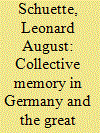| Srl | Item |
| 1 |
ID:
164358


|
|
|
|
|
| Summary/Abstract |
Embedded within the wider normalization–continuity debate about the nature of Germany’s actorness, this article assesses the impact of collective memory on German foreign policy during the European refugee crisis. The Federal Republic’s open-door policy in autumn 2015 bewildered many observers who saw it as a self-harming act of charity. Based on a three-stage empirical framework, the article argues that Germany’s initial behaviour cannot be understood without accounting for the influence that collective memory still exerts in Germany today. The open-door policy was irreconcilable with Germany’s immediate material interests, but instead shaped by collective memory-inspired humanitarian and European principles. This conclusion challenges the growing consensus among students of German foreign policy that Germany is becoming a normal actor which has freed itself from the constraints of the past and behaves in congruence with its material interests. This article seeks to make a timely contribution to the knowledge about collective memory in international relations, Germany’s foreign policy in the specific as well as wider context, and the dynamics of the European refugee crisis.
|
|
|
|
|
|
|
|
|
|
|
|
|
|
|
|
| 2 |
ID:
185571


|
|
|
|
|
| Summary/Abstract |
The election of Donald Trump posed an existential challenge to NATO. At the end of his tenure, however, the US president had neither withdrawn membership nor substantially undermined the alliance from within. This article helps explain the puzzle of why NATO survived Trump's presidency. Extant explanations emphasize domestic factors such as the US foreign policy machinery and entrenched liberal ideology, structural reasons and Trump's idiosyncratic personality. While these accounts possess some explanatory value, they remain incomplete as they omit one central factor: NATO's leadership. Drawing on more than twenty original interviews with senior officials, the article demonstrates that particularly Secretary-General Stoltenberg's strategic responses were a necessary factor in changing Trump's stance on burden-sharing and helped maintain a robust deterrence policy toward Russia. These findings carry important implications both for theoretical debates on international organizations' agency in fending off contestation and policy debates on which actors shape NATO by emphasising the hitherto understated role of the secretary-general.
|
|
|
|
|
|
|
|
|
|
|
|
|
|
|
|